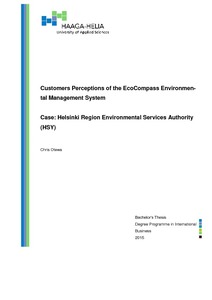Customers Perceptions of the EcoCompass Environmental Management System
Otewa, Chris (2015)
Otewa, Chris
Haaga-Helia ammattikorkeakoulu
2015
All rights reserved
Julkaisun pysyvä osoite on
https://urn.fi/URN:NBN:fi:amk-2015112618037
https://urn.fi/URN:NBN:fi:amk-2015112618037
Tiivistelmä
This research based thesis is commissioned by Helsinki Region Environmental Services Au-thority (HSY). It is the main regional body in charge of providing water, waste and air quality services to Helsinki residents. It operates a product labelled EcoCompass environmental management system which assists small and micro medium businesses reduce their envi-ronmental impacts while conducting their operations.
This thesis aimed at investigating how beneficial EcoCompass environmental management system is to the customers. This was accomplished by surveying how current and potential customers perceived the overall EcoCompass environmental management system. The re-sults of the thesis enabled the client company to assess the overall performance of the Eco-Compass environmental management system and additionally analyse if there was a need to market it even further to more customers in Helsinki, other cities in Finland or internationally.
To meet the thesis objectives the author drafted five investigative questions which have been resolved by either the theoretical framework or the questionnaire surveys that were sent to current and potential customers.
The theoretical framework consisted of two chapters; the first chapter investigated the hierar-chical structure of sustainable supply chain management and how environmental manage-ment systems are established. The second chapter conceptualized the overall EcoCompass environmental management system.
The empirical study was conducted through quantitative research method. Data was collected via webropol a web administered data collection tool. Email questionnaire surveys were sent separately to 69 current customers and 39 potential customers between (late March 2015 and late May 2015).
The research findings demonstrated that current customers are satisfied with the overall per-formance of EcoCompass Environmental Management System and that potential customers would be willing to recommend it to their subcontractors. This justified that the EcoCompass Environmental Management System is a beneficial product. The results of the findings could not be generalised due to the low response rate. However, they could be utilized as an indica-tor exhibiting the customer’s perceptions of the EcoCompass Environmental Management System.
Finally, based on the researched theoretical framework and feedback from the questionnaire surveys, the author listed some recommendations for the case company to take into consid-eration.
This thesis aimed at investigating how beneficial EcoCompass environmental management system is to the customers. This was accomplished by surveying how current and potential customers perceived the overall EcoCompass environmental management system. The re-sults of the thesis enabled the client company to assess the overall performance of the Eco-Compass environmental management system and additionally analyse if there was a need to market it even further to more customers in Helsinki, other cities in Finland or internationally.
To meet the thesis objectives the author drafted five investigative questions which have been resolved by either the theoretical framework or the questionnaire surveys that were sent to current and potential customers.
The theoretical framework consisted of two chapters; the first chapter investigated the hierar-chical structure of sustainable supply chain management and how environmental manage-ment systems are established. The second chapter conceptualized the overall EcoCompass environmental management system.
The empirical study was conducted through quantitative research method. Data was collected via webropol a web administered data collection tool. Email questionnaire surveys were sent separately to 69 current customers and 39 potential customers between (late March 2015 and late May 2015).
The research findings demonstrated that current customers are satisfied with the overall per-formance of EcoCompass Environmental Management System and that potential customers would be willing to recommend it to their subcontractors. This justified that the EcoCompass Environmental Management System is a beneficial product. The results of the findings could not be generalised due to the low response rate. However, they could be utilized as an indica-tor exhibiting the customer’s perceptions of the EcoCompass Environmental Management System.
Finally, based on the researched theoretical framework and feedback from the questionnaire surveys, the author listed some recommendations for the case company to take into consid-eration.
